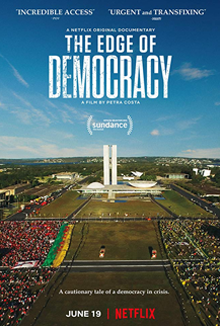
I’d planned on watching this a little earlier but it does seem appropriate to watch this alongside the drama of the 2020 US elections. This is a documentary that tells the story of how Dilma Rousseff was impeached as president of Brazil and how Luiz Inácio Lula da Silva ended up being imprisoned. It is highly relevant to Brazil’s current situation as the eventual victor of the whole kerfuffle is Jair Bolsonaro who remains president today.
The film’s focus is really on Rousseff’s downfall and its subsequent repercussions but in order to reach that point it has to cover a lot of territory to explain the events leading up to her election as president in the first place. This means it acts as an effective primer on modern Brazilian politics covering everything from its history of military dictatorships, the right-wing elites who dominate its economy and politics, the detention and torture of left-wing revolutionaries, the construction of the capital city of Brasilia, the founding of the Worker’s Party, up to the election of Lula. It presents Lula’s two terms as president, after running and losing three times before that, as an unalloyed success due to the massive popularity of the Bolsa Familia program he introduced. After leaving office, Rousseff wins election as his anointed successor and the deterioration of the country’s economy causes her to lose popularity. Meanwhile the Operation Car Wash corruption investigation snowballs to include both Lula and Rousseff, eventually leading to the latter’s impeachment.
This is a complex story covering many political players and spans decades. Nonetheless filmmaker Petra Costa does an admirable job of drawing the audience into the films and lays things out clearly even for those who don’t know much about Brazilian politics. It helps immensely that she puts herself into the narrative with her own judgmental comments and makes it clear that she is not an impartial observer. Both of her parents were socialist activities and had to hide from the government of that era. She interviews her own mother on her opinions and perhaps because of that pedigree, she enjoyed direct access to both Lula and Rousseff, being in a position to capture them in intimate settings. At the same time, she reveals that her grandparents’ families are actually part of the right-wing elites and her grandfather was a co-founder in one of the major construction companies directly implicated in the corruption scandals. That makes her own family a potent symbol of the deeply divided nature of Brazilian society and her personal emotions in the matter make this feel engaging and directly relevant.
Despite the fact that she clearly favors the left, she does excoriate them as well, pointing out that Lula only finally managed to win the presidency after making a deal with the right. I do feel that she lets them off a little too lightly. While it is true that there was never any convincing evidence against Lula, there seems to have been plenty of evidence implicating his personal aides and other politicians in his party so as their leader, surely he bears some responsibility? She also seems to skip over Rousseff’s economic mismanagement. Without the massive drop in popularity that this caused, the right would never have been emboldened enough to impeach her, even if they did so on a flimsy pretext. But most of all, she accuses the right of exploiting the divide in the Brazilian people to advance their own private interests, which is very true, but is unable to offer any answers as to how to heal this divide. Then again, it’s the same story the whole world over and no one knows how to solve that.
I do want to stress that after having watched this, the right in Brazil absolutely are evil scumbags. I’m more hesitant however to agree with the director that this event is symptomatic of a wider breakdown of democracy. It seems to me that Brazil’s problems are very specific to it, due to separate elections for the presidency and congress and the president being unable to do much without the approval of congress. Their justice system surely needs reform as well and is probably a legacy of the country’s authoritarian right-wing past. But Brazil’s problem is that the left needs to garner enough popular support to implement these reforms. So far it has not, and that is probably because the different people who make up the population really do want different things and have different preferences. Nevertheless this is an excellent documentary and I would highly recommend it anyone who is curious about what is happening in Brazil.